Jason Gorber's Cineruminations: SKYFALL And The Bonds Of Nostalgia
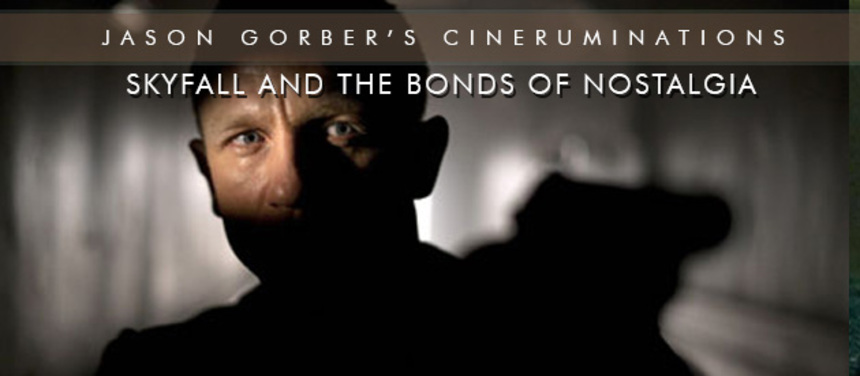
We've gone a little Bond crazy here at ScreenAnarchy, with a whole slew of Bond-themed articles dissecting the casting, the cars, the tunes, and so on, leading up to the North American release of Skyfall. Collectively the Bond flicks are a series of action/adventure films that certainly warrant such reflection, and we've had plenty of time to think about such things given the delays incurred due to the implosion at MGM that resulted in a slightly longer break than normal between installments in the franchise.
Growing up, Bond on screen was of the Roger Moore ilk, filled with adventures, gadgets and scantily clad plasticized women that I never took particularly seriously. I always found the films either too campy or not camp enough, and had no real emotional connection to the character save as an iconic spyman. I read Rober Ludlum's spy books at an early age, and found the likes of the Jason Bourne character on the page completely engaging (with the best first name for an action star ever), enjoying the character as he sprinted off to exotic locales to try and capture Carlos the Jackal. It's no secret that Raiders of the Lost Ark started life as a James Bond-type character, subbing Archaeology for MI6, and I responded far more heartily to the whip and hat shtick rather over the man with the drinking problem and massive tuxedo budget.
When the likes of Mission: Impossible films escalated the travelogue adventure to a new level, the Bond films of the time seemed even more ridiculous somehow. By the time Brosnan was quipping about making "Christmas come", and we were meant to buy Denise Richards as a "noo-que-lur" physicist, I officially gave up on the character.
Yet just three years after the nadir that is The World is Not Enough, audiences saw Jason Bourne erupt on screen. Here was a visceral, no nonsense action hero that thought on his feet, and didn't need ejector seats to get out of a jam, simply a wall map, a fire extinguisher, and a bunch of plate glass to throw an assailant through. Part MacGuyver, part Krav Maga demonstration, the series made an improbable action icon out of Matt Damon, and managed in that single film to out-Bond pretty much ever previous Bond film.
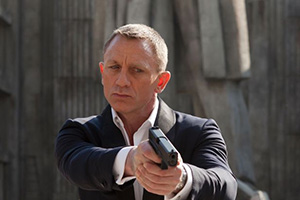 I'm sure there are those who can separate Bourne
from Craig's take on the character of James Bond, but given their temporal
proximity and tonal accordance, I genuinely feel that we have Damon's contribution
to thank for the revitalization of 007. It's as if the keepers of the Bond
flame finally decided to take things seriously (well, more seriously at
least) once they saw what the Bourne filmmakers were doing, and decided to
try and actually make an engaging and mildly plausible film where we see
consequences for certain actions. Drawing also from the likes of Raiders or
even Die Hard, where the hero gets into genuine moments of jeopardy and
experiences cinematically interesting setbacks, Casino Royale rewrote Bond
on film by going back to visceral nature of Fleming's first book, and did so
with aplomb.
I'm sure there are those who can separate Bourne
from Craig's take on the character of James Bond, but given their temporal
proximity and tonal accordance, I genuinely feel that we have Damon's contribution
to thank for the revitalization of 007. It's as if the keepers of the Bond
flame finally decided to take things seriously (well, more seriously at
least) once they saw what the Bourne filmmakers were doing, and decided to
try and actually make an engaging and mildly plausible film where we see
consequences for certain actions. Drawing also from the likes of Raiders or
even Die Hard, where the hero gets into genuine moments of jeopardy and
experiences cinematically interesting setbacks, Casino Royale rewrote Bond
on film by going back to visceral nature of Fleming's first book, and did so
with aplomb.
There are some stumbles along the way - Royale is overlong, the poker game more tedious than necessary on repeated viewings, and the end sequence just a little bit drawn out. It may be overpraised slightly, just as its follow up, Quantum of Solace, is unjustifiably vilified. Sure, QoS takes the Bond/Bourne shtick to an even greater extent, complete with nausea inducing shaky cam, but I really responded to many elements in that film. I particularly enjoy the opening sequence, the portion of the film I've rewatched many times, a pretty magnificent car chase/action scene that's provides as much audio bliss as we've got from almost any action flick. What always bothered me about the Bond series was the inherent rebooting film-to-film from the previous works. I'm someone much more conditioned to episodic consistency, and greatly prefer seeing a character evolve rather than pretend none of the backstory actually happened. The constant reinvention is something that I guess comic book fans are used to (running characters into the ground over and over), but I tend to respond better when I feel that a returning character is filling in blanks of a greater whole. By having Quantum begin seconds after the conclusion of the previous film, I could begin to care more about this character, unafraid that he'd be yet again a blank slate next outing save for a few quirky sidekick characters that tied the works together. Sure, Indy does similar jumps, but as least I know that between Raiders and Temple of Doom (or vice versa, given that chronology), it's the same Indy that I'm rooting for, the baggage of the character helping create a more robust story rather than dragging the story down.
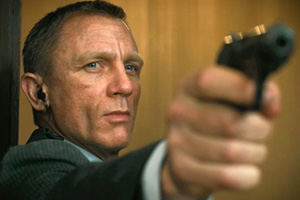 Because of this closer connection, I've long argued that Royale
and Quantum should not be seen as separate films but pieces of a whole, one
long film to be seen back-to-back as a single experience. The pace of the
second Craig film is less problematic in seen in context of that whole, the
more kinetic style of Quantum feeling very much like a final crescendo
after Royale's relatively slow build. Quantum's finale left me
completely satisfied on these grounds, and I had figured that we now had all
the pieces in place to move the character forward. I believed that this "fresh
start" Bond would begin forging ahead with the third Craig film, freed from
having to establish character backstory, impulse, etc. We knew who this guy
was, the new rules and new-look playground had been well established, and we
could march forward. As such, my argument has been that the best Bond film of all was
the hybrid extendo-cut mashing the two films together, a kind of Casino of
Solace, as it were.
Because of this closer connection, I've long argued that Royale
and Quantum should not be seen as separate films but pieces of a whole, one
long film to be seen back-to-back as a single experience. The pace of the
second Craig film is less problematic in seen in context of that whole, the
more kinetic style of Quantum feeling very much like a final crescendo
after Royale's relatively slow build. Quantum's finale left me
completely satisfied on these grounds, and I had figured that we now had all
the pieces in place to move the character forward. I believed that this "fresh
start" Bond would begin forging ahead with the third Craig film, freed from
having to establish character backstory, impulse, etc. We knew who this guy
was, the new rules and new-look playground had been well established, and we
could march forward. As such, my argument has been that the best Bond film of all was
the hybrid extendo-cut mashing the two films together, a kind of Casino of
Solace, as it were.
This, of course, brings us to Skyfall, the film that I hoped would kickstart off the newly rejuvenated character free from concerns about the past, moving forward with a freedom gained by laying out the foundation with the previous two films.
I should note that if you haven't seen Skyfall yet, you should probably wait to read the rest of this article until you do so. For more than perhaps any other Bond film ever, this is a very spoiler-sensitive plot, with much of the pleasure of watching the latest installment of the Bond story being generated by genuine surprise due to not knowing ahead of time about certain key plot points.
While the praise hasn't quite been universal, there are nonetheless many that are already dubbing Skyfall the best Bond ever. Even detractors have to admit there's a lot to adore about the film. Casual filmgoers are likely to notice how pretty the film looks, but any serious cinephile is likely to effusively gush like I did over Roger Deakins' photography. Combined with Mendes' assured direction and knack for staging action sequences in particularly visually stunning ways, this seems to inarguably be the best looking Bond film of all time. If Deakins finally gets his Oscar for this title, I won't be the least bit disappointed (even if it's criminal he lost out given how stunningly photographed True Grit was).
Despite having a big chunk of the first reel spoiled by the trailer, the first 20 minutes of the film are pretty delicious, with incredible set pieces and "oh shit!" action moments that are as enthralling as they are original. There's an unadulterated freshness to the film that elevates these opening moments, and they do so that's the copy of no other film.
Actually, there's one caveat to this - as we've got more and most Bond-ish or Bournean films being made, there are other films that take the trappings of this type of cinema and try and make it their own. I'm sure that the makers of Skyfall weren't particularly pleased when the makers of Taken 2 decided to also set their film in Instanbul, with a chase atop the grand bazaar. Luckily, few saw the truly repugnant film (despite Liam Neeson trying as hard as always to shine a turd diamond), so for much of the Skyfall audience the connection won't be as explicit as it was for this poor film reviewer.
As the film plays out, the scope of Skyfall actually narrows as it goes along. We go from massive machinery and wide expanses to a battle in a rundown home, a kind of Straw Dogs (or, if you prefer, a child-free Home Alone) invasion battle that feels almost claustrophobically intimate by the end. It sort of reminded me of Empire Strikes Back, where the large scope action is right at the forefront, while as the film progresses things become more and more focused on central disagreements on a human scale.
It was during these more intimate moments that I felt the film slipping away. It's hard to justify my dissatisfaction, given that what I liked about the other two Craig films was the sense of building an actual, dimensional character. And yet, when Skyfall provides clear answers to some questions (many we weren't even particularly interested in asking), it makes the whole thing feel all the more preposterous. This contradiction didn't leave me dissatisfied with the film, but it does upon reflection leave me a little bit cold about how they chose to wrap the film up.
Regardless, I think it's clear that Skyfall, more than any other work in the series, traffics in homage and nostalgia for a previous era of Bond films. Skyfall winks at the past, particularly how it draws upon elements from the Connery-era. The film is making you aware that you're watching a film that's part of a full series where we're picking and choosing what counts as "canon", and expects you to be playing along. In many ways, Skyfall is a love letter from James Bond to himself.
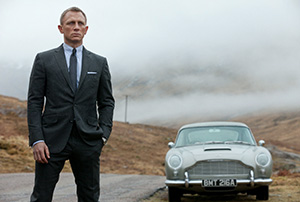 The most explicit example of this, of course, is the Aston
Martin DB5 cheekily brought forth onscreen, one that that is well established
to be the exact model used by Connery in Goldfinger (the fact that it's
a modern replica painstakingly constructed to reference the original is even
more fitting to my larger argument). The introduction of the car is a
counterpoint to an earlier scene where our new "Quartermaster" hands James his Walther
PPK and small homing device, and Bond complains that he's not getting any new
fancy kit. This of course only works if you're aware of the usual trappings of
this particular series of film, and what's weird is that it's as if the
characters themselves have seen the films and are commenting on them.
The most explicit example of this, of course, is the Aston
Martin DB5 cheekily brought forth onscreen, one that that is well established
to be the exact model used by Connery in Goldfinger (the fact that it's
a modern replica painstakingly constructed to reference the original is even
more fitting to my larger argument). The introduction of the car is a
counterpoint to an earlier scene where our new "Quartermaster" hands James his Walther
PPK and small homing device, and Bond complains that he's not getting any new
fancy kit. This of course only works if you're aware of the usual trappings of
this particular series of film, and what's weird is that it's as if the
characters themselves have seen the films and are commenting on them.
Skyfall is a Bond film that's homage to Bond films. It's a film that makes one ask an interesting aesthetic question - can an homage be considered superior to the work that it's alluding to, when it derives much of its pleasure from the previous works it's echoing? In this case, it seems to be that Skyfall can use Connery's Bond and the entire Goldfinger era as shortform, while crafting its own narrative free from having to abide by earlier timelines or events. It may be cheating, of course, but it's an effective ploy, and one of the strengths of the film.
What I found more problematic than the nostalgia was the actual finale. Sure, the death of Judy Dench's M is earned (if telegraphed pretty seriously from about 10 minutes into the film), but the whole notion of Bond having an explicit backstory I found troubling.
In my conversation with Lindy Hemming, the Oscar winning costume designer that dressed Bond in 5 films, from Goldeneye through to Royale, we discussed some of the more interesting attributes of the character, particularly with regard to the notion of class. As I quoted in my previous article, Hemming noted that "when the first director, Terence Young, got his hands on the material, he was a tank commander, had been in the war, he knew what kind of guy [Bond] was. So I think the inspired choice of Sean Connery, in the hands of these two guys who were the real class, and Sean Connery wasn't, there was a dynamic setup between Connery's animalistic, working-class guy and their choice of his tailoring, placing him, and directing him how they thought he should behave. There's a tension there, which is why Connery, and that Bond, broke out of the screen and became an icon almost immediately." The part of the character I always kind of bought was the whole "pitbull in a tuxedo" nature of Bond, the tough guy completely at home in so-called "high society", but underneath the beautifully cut suit was someone waiting to rampage at any moment. This is the character that Craig brought to the modern Bond, and (for the time) what Connery (and to an extent Dalton) did as well.
Hemming also noted that bond was almost always played by a Celt, something she suggested was important in establishing the character as an outsider to eminently "English" society. Skyfall makes this factor explicit, showing the birthplace of our hero on the moors where people speak in thick brogues, not unlike the man who first drove that DB5 on screen in the 60s.
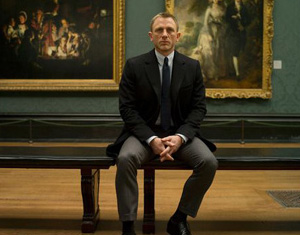 I liked the idea better of Bond coming from modest means and
having to scrap his way up to fit in with the establishment class, but I like
more the notion that he really has no back story of his as a youth, he is, and
will always be, the Spy we love. Skyfall tries to be slightly coy with the full
details of the backstory, but by emphasising the notion of the character being
orphaned, and then showing the place of his childhood, it fills in blanks that
I'm not sure add tremendously to our enjoyment of the character.
I liked the idea better of Bond coming from modest means and
having to scrap his way up to fit in with the establishment class, but I like
more the notion that he really has no back story of his as a youth, he is, and
will always be, the Spy we love. Skyfall tries to be slightly coy with the full
details of the backstory, but by emphasising the notion of the character being
orphaned, and then showing the place of his childhood, it fills in blanks that
I'm not sure add tremendously to our enjoyment of the character.
The Freudians will go nuts with talk of the death of Bond's surrogate Mother in his arms, but after the fact it all seems even more contrived than much of the earlier moments of the film. Falling through the ice, a flashlight bouncing in the dark, these are all beautiful moments visually, but are just a bit too hard to pass the plausibility test. The fact that I buy him falling off that train and being shot more than I buy the final moments of the film is a direct reflection of this change of scope - bring things into this more intimate setting, and the arch manipulation of our character's feelings are made more manifest. Kept as giant, broad strokes, with buildings blowing up and construction equipment molesting train cars, and we just buy it without as much reflection.
We don't need to see Bond cradling his mentor to feel for him, as it was better to see him sailing off into the sunset in Royale, jaw set, clearly pissed and just wanting to kill someone. It's good to give Dench a worthy exit, to be sure, and I admit that if they would have got Connery to actually play the role of Kincade I would have been giddy at the delightful synergy, rendering much of my arguments above invalid.
Similarly, having the bad guy be fraternal, with a fellow double-Oh spy, a lost sibling, a darker version of our lead, we're made to feel that the history of this character is important for understanding the present. This is of course critical for any actual, rich character in a different kind of work, but I'm not sure James Bond needs to have that backstory pre-Casino Royale for us to feel for him. The elements of "PTSD" hinted at in his psych evaluation are more than enough, we don't also have to know he's got issues from his childhood to buy the man shooting his way through any given situation on some licensed, murderous rampage.
Bond may in fact suffer by being presented as this fully dimensional character, his drive now being less one of being a bad-ass tool of his government, and instead a genuine human being who is mildly broken by the effects of his distant past. I would suggest moving forward this type of depth of character outside the framework of his role as a 007 will be completely forgotten, making for this foray into the deep recesses of his past a mere blip on the timeline of the Bond franchise.
Whether or not the efficacy of the psychoanalytic delving into the past of our lead is accepted or not, what is clear that the finale of Skyfall basically shouts "no we're done setting things up, really!", presenting a capper to the Craig-fueled renaissance. The fact that this could be the last Craig film now that we're really, really ready to push forward with the neo-Bond may prove to be interesting in itself, with the full extent of Craig's portrayal being the exemplar of the character that merely exists to move from the campy silliness of decades of the character's presentation to a new, slightly more grounded take on the stories. I think Craig brings much to the role, and would like him to continue, welcoming him back even if the tired "too old for this shit" shtick will almost inevitably have to make a return in the next iteration.
However future casting plays out, Skyfall stands as the end of this newest beginning. I'm not sure the film can be seen as a standalone piece, separated either from Royale and Quantum, nor even the likes of Goldfinger. It works best as the part of a greater puzzle, satisfying to be sure, but only in the sense of how it fits with the other pieces. I look forward to watching this latest film slotted in with the others it shares deep connection with, screening it back-to-back with the other Craig films. While I think that'll make a fine character arc, I'm not sure that the title for the Royale SolaceFall marathon works as nicely together as the respective films do.
We should celebrate that we've come a long way from the nadir of the series, the keepers of the Bond flame finding yet another interesting way of keeping the character relevant. Mendes seems to have been the absolute right choice for this particular iteration, and it'll be most interesting to see just who can bring the character further forward. For now, we can enjoy the unabashed nostalgia of Skyfall, revel in seeing a beautifully shot action film unfold on screen, and forgive some of the more egregious elements as being simply a work trying just a bit too hard to slam that final piece in to complete the puzzle.
The most overt metaphor of the whole piece, after all, is the lingering shot as we see the beloved icon of a grey British roadster obliterated by round after round of assault weaponry. You can almost hear the vehicle cry out as the bullets rip the form apart, glass shattering, lights extinguished. We see the death of the past in this one shot, its meaning only relevant for those that care about Bond as a continuing series. In killing the car, perhaps they've also killed the need to wallow in the past, a past we can now fully put to rest and move forward with the character. I can't wait to see if they have the gumption to really give us something new and extraordinary the next time 'round, the ingredients are certainly there for something extraordinary.
Whatever happens, there's only one thing inevitable, that is that there will be another iteration. For, as the end credits always promise, in whatever form, following whatever timeline, "James Bond will return...."







